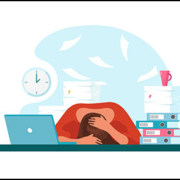A Good Night’s Sleep is essential
A Good Night’s Sleep is essential
There is always too much to think about and to do when you’re a small trader running your own business, so a good night’s sleep is essential.
But too many of us find ourselves lying in bed wakeful with so many thoughts running through our heads.
Almost three quarters of people in the UK (71%) don’t get the recommended 7-9 hours of sleep per night, according to a study, external last year by insurance group Direct Line. It found that one in seven were getting less than five hours.
Sleep issues can be caused by a wide variety of factors, including stress, shift work and caffeine or alcohol consumption.
A lack of sleep plays a role in high blood pressure, heart disease, diabetes, and even mental health problems, according to the UK Health Security Agency, external (which was previously called Public Health England).
And that spills over to the economy. One report says that sleep deprivation costs the UK up to £40bn a year in lost productivity., external
So what can you do to ensure you get a good rest so your brain is firing on all cylinders during the working day?
Rather than sleeping pills why not try the phenomenon of sleep stories – which are soothing tales provided via apps and podcasts.
Try a google to find out more.





